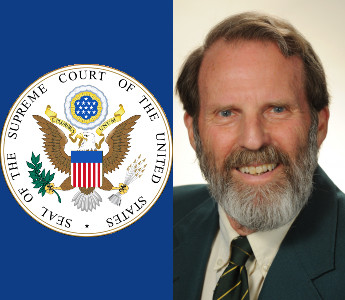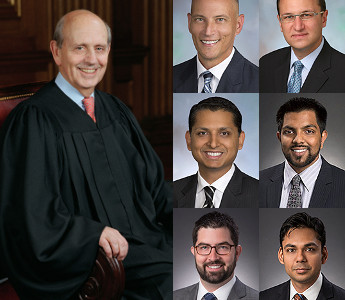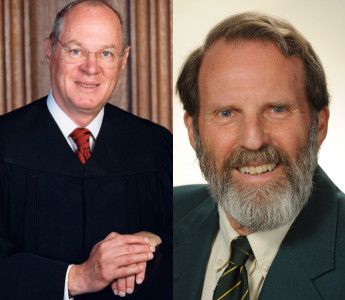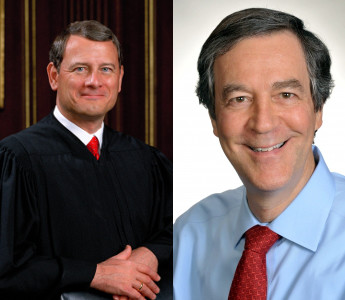Salman v. United States, 580 U.S. ___ (2016) (Alito, J.).
Response by Professor Randall D. Eliason
Geo. Wash. L. Rev. On the Docket (Oct. Term 2016)
Slip Opinion | New York Times DealBook | SCOTUSblog
Stock Tips Make Bad Holiday Gifts
Insider trading is a particularly murky area of criminal law. Because no statute defines the offense,1 its parameters have been fleshed out in court decisions over the past few decades. On December 6 the Supreme Court wrote the latest chapter on insider trading in Salman v. United States,2 affirming an expansive view of insider trading liability and resolving an important circuit split in the government’s favor.
The Standards for Tippee Liability: Dirks v. SEC
Insider trading is buying or selling securities based on material, non-public information, in violation of a duty of trust and confidence.3 But its prohibition would be easily evaded if a corporate insider, forbidden to trade herself, could simply tip off an outside friend or family member and encourage them to trade instead. Accordingly, in some circumstances such “tippees” may themselves be charged with insider trading.
The Supreme Court first addressed tippee liability in Dirks v. SEC4 in 1983. Dirks held that a tippee who does not owe a direct duty to shareholders may nevertheless be liable for insider trading, but only if: (1) the tipper was violating a duty by providing the information; and (2) the tippee knew or should have known about that violation.5
Whether the tipper was violating a duty, the Court said, turns on the purpose of the tip: “[T]he test is whether the insider personally will benefit, directly or indirectly, from his disclosure. Absent some personal gain, there has been no breach of duty to stockholders. And absent a breach by the insider, there is no derivative breach [by the tippee].”6
The Court recognized that potential benefits to tippers are not limited to monetary gains and may include reputational benefits or other intangibles. In particular, a benefit could be inferred when an insider “makes a gift of confidential information to a trading relative or friend.”7
An important aspect of the Dirks test, therefore, is determining whether the tipper received a personal benefit sufficient to find a breach of duty. The Court took the Salman case to shed some light on how courts should approach this question.
Salman v. United States: What Qualifies as a Benefit to the Tipper?
Salman represents the Court’s first foray into tippee liability since Dirks. Maher Kara, a Citigroup investment banker, repeatedly passed confidential information about upcoming mergers and acquisitions to his brother Michael, knowing that Michael would use it to trade. Michael, in turn, shared the information with Bassam Salman, a close friend whose sister was married to Maher. Salman made more than $1.5 million by trading on these tips before the scheme was discovered. He was convicted of insider trading and sentenced to thirty-six months in prison.
On appeal to the U.S. Court of Appeals for the Ninth Circuit, Salman urged that court to apply a controversial standard announced two years ago by the U.S. Court of Appeals for the Second Circuit in United States v. Newman.8 In Newman the court held that in order to establish a benefit to the tipper the government had to show a “meaningfully close relationship” between tipper and tippee, one that “generates an exchange that is objective, consequential, and represents at least a potential gain of a pecuniary or similarly valuable nature” for the tipper.9
Salman argued that Maher was simply helping his brother out and did not receive anything of a “pecuniary or similarly valuable nature” in exchange. Under the Newman test, he claimed, that meant no violation of a duty by Maher and thus no tippee liability for Salman.
The Ninth Circuit rejected Salman’s arguments, concluding the case involved a straightforward application of Dirks and disagreeing with the holding in Newman.10 That created a circuit split that likely led the Supreme Court to take Salman’s case.
In a unanimous opinion by Justice Alito, the Supreme Court agreed with the Ninth Circuit and held that Dirks “easily resolves the narrow issue presented here.”11 Dirks, the Court observed, said that personal benefit may be inferred when an insider “makes a gift of confidential information to a trading relative or friend.” Maher passed information to his brother knowing he would trade on it, which falls squarely within the language of Dirks.
The Court noted that if Maher had traded on the information himself and given the proceeds to his brother, there is no question that would be insider trading. By passing the information to his brother to allow him to trade, Maher achieved exactly the same goal. “In such situations, the tipper benefits personally because giving a gift of trading information is the same thing as trading by the tipper followed by a gift of the proceeds.”12 Because he obtained this personal benefit, sharing the information was a violation of Maher’s duty of trust and confidence to his clients—a duty that Salman inherited and violated when he later traded on the information with full knowledge of its improper origins.
The Supreme Court expressly rejected the more stringent benefit test adopted by Newman: “[t]o the extent that the Second Circuit [in Newman] held that the tipper must also receive something of a ‘pecuniary or similarly valuable nature’ in exchange for a gift to family or friends . . . we agree with the Ninth Circuit that this requirement is inconsistent with Dirks.”13
The Court also rejected Salman’s claim that the benefit test was unconstitutionally vague. Although it agreed that determining whether a benefit occurred might be difficult in some cases, the Court said it did not need to confront that issue because “Salman’s conduct is in the heartland of Dirks’s rule concerning gifts.”14
Issues that Remain After Salman: Moving Beyond Friends and Family
The most significant aspect of Salman is its rejection of Newman.15 Because the Second Circuit includes New York and Wall Street, Newman had caused quite a stir and was seen as a significant blow to the government. Salman should give a boost to both criminal and civil insider trading investigations.
Some commentators have suggested Salman leaves unanswered how close a friendship must be before the tipper can be said to benefit from disclosure, but future cases are unlikely to hinge on such questions. Basing criminal liability on whether a friendship was sufficiently “meaningfully close” would likely be vague and unworkable.
Dirks held that whether disclosure is a breach of duty “depends in large part on the purpose of the disclosure,” and the Court in Salman reaffirmed this language.16 The proper test, therefore, should focus not on the nature of the relationship but on the purpose behind the tip.
The government in Salman argued that the benefit requirement of Dirks is met any time an insider discloses information for a personal purpose rather than a corporate purpose.17 The Court did not need to go that far because Salman fell squarely within the language of Dirks about disclosure to a family member. But for future cases a test that hinges on the tipper’s purpose is the logical outgrowth of Dirks and Salman.
To borrow an analogy used during oral argument, suppose I see a sad person on the street and feel bad for them, so I give them inside information intending that they trade on it. If I traded on the information myself and give the stranger the money, that would be insider trading. That tip benefits me – it allows me to make the desired charitable gift without actually taking money out of my pocket. As the Court said in Dirks: “[t]he tip and trade resemble trading by the insider himself followed by a gift of the profits to the recipient.”18
A test based on the tipper’s purpose does not hinge upon the closeness of the relationship between tipper and tippee. An insider who tips to a family member, occasional golfing buddy, or stranger on the street is not acting for any proper corporate purpose. All such disclosures violate the insider’s duty to refrain from using corporate information for some personal end.
Tippee liability based on gifts of information is unlikely to be limited to close friends and family. Anyone who believes Salman leaves them free to act on improper tips from casual acquaintances will likely find that prosecutors disagree. The Court’s unanimous reaffirmation of Dirks and rejection of Newman signify that it remains very comfortable with a robust theory of insider trading liability.
In addition to being a Professorial Lecturer in Law at The George Washington Law School, Randall D. Eliason specialized in white collar crime for over eight years as a member of the Public Corruption/Government Fraud section of the Office of the United States Attorney for the District of Columbia. From 1999 to 2001, he served as chief of that section and supervised a staff of eleven AUSA’s prosecuting white collar cases in federal court. Mr. Eliason is the recipient of numerous awards and commendations from the U.S. Department of Justice, Federal Bureau of Investigation, Washington D.C. Metropolitan Police Department, and other law enforcement agencies.
Randall D. Eliason is also a frequent media commentator on issues related to corporate and white collar crime and has appeared on PBS’s Frontline, NBC’s Nightly News, NPR’s Morning Edition, CNN, MSNBC, and elsewhere. His writings on federal criminal law have been published in law reviews, legal periodicals, and newspapers including The Washington Post and the Chicago Tribune. He writes about white collar crime and federal criminal law at Sidebars Blog, which was recently named one of the Top 100 “Blawgs” by the ABA.
- Insider trading is prosecuted under the Securities Exchange Act of 1934, which prohibits the use of any “manipulative or deceptive device” in contravention of the rules of the SEC. 15 U.S.C. § 78j(b) (2012). SEC Rule 10b-5, in turn, prohibits any “device, scheme, or artifice to defraud” in connection with the purchase or sale of any security. 17 CFR § 240.10b-5 (2016). The SEC has long considered insider trading to be a violation of Rule 10b-5, and the Supreme Court has agreed.
- Salman v. United States, No. 15-628 (U.S. Dec. 6, 2016).
- “Classical” insider trading involves a corporate insider who trades on confidential company information in violation of the duty owed to the company’s shareholders not to use such information for personal gain. The “misappropriation theory” of insider trading applies when someone who is not a corporate insider possesses inside information and trades on it in violation of a duty owed to the source of the information—for example, outside counsel for a corporation who knows about an upcoming deal and trades based on that information. The parties in Salman agreed that the standards for tippee liability were the same under either the classical or the misappropriation theory. See Salman, slip op. at 6 n.2.
- 463 U.S. 646 (1983).
- Id. at 660–61.
- Id. at 662.
- Id. at 663–64.
- United States v. Newman, 773 F.3d 438 (2014), cert. denied, 577 U.S. ____ (2015).
- Id. at 452.
- Salman v. United States, 792 F.3d 1087 (9th Cir. 2015).
- Salman, No. 15-628, slip op. at 8.
- Id. at 10.
- Id.
- Id. at 11.
- Newman also addressed the government’s burden concerning the tippee’s knowledge. The Second Circuit held the government must prove the tippee knew both that the tipper had violated a duty and that he had received a benefit as a result. Newman, 773 F.3d at 447–50. The knowledge issue was not before the Supreme Court in Salman (see slip op. at 5 n.1) but the briefs, oral argument, and opinion all indicate the government now agrees with that holding. See Salman, slip op. at 8. Salman therefore also provides some clarity on the knowledge issue, and that portion of Newman appears to remain good law.
- Id. at 9.
- Id. at 7.
- Dirks, 463 U.S. at 664.
Recommended Citation:
Randall Eliason, Response, Salman v. United States: Stock Tips Make Bad Holiday Gifts, Geo. Wash. L. Rev. On the Docket (Dec. 11, 2016), http://www.gwlr.org/salman-v-united-states-stock-tips-make-bad-holiday-gifts.





